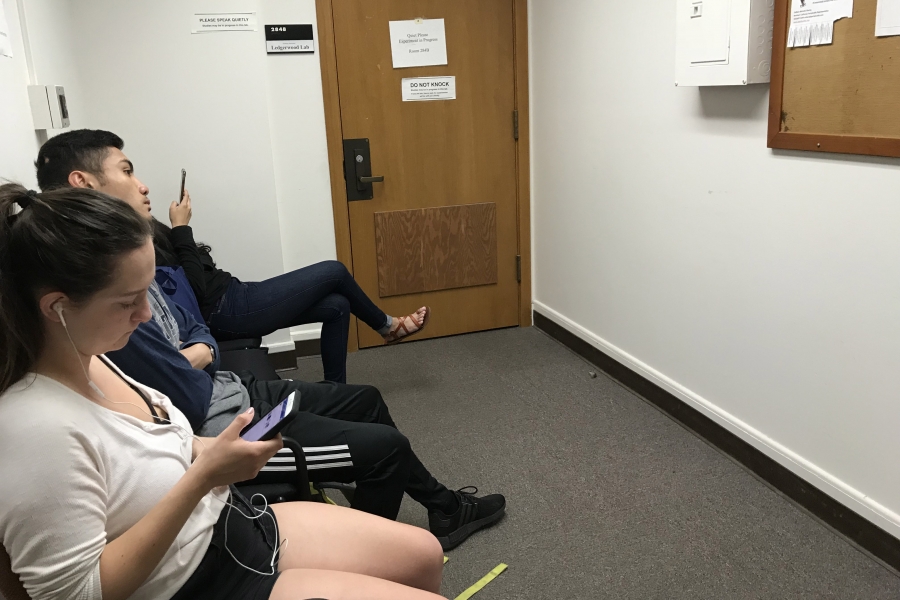
Classes encourage students to participate in research study programs on campus
Many people at UC Davis have participated in research study programs, better known as SONA. These research studies are open to any student and require an individual to voluntarily sign up and attend the research study at the scheduled time and date. For some students, participation in research studies may offer extra credit, while for others, they may be a requirement for the class.
Research often occurs in Young Hall, and participation may consist of a time investment from several minutes to several hours. Most often, these studies require a student to answer questions or respond to stimuli on a computer, observed by a research assistant manning the room.
The research is offered in both an in-person and an online setting, with tasks differing slightly for each setting. Johann Leffler, a third-year communications major, has participated in SONA research in the past, and elaborates more on the experience.
“I’ve participated in a few studies, but only the online ones, never in person,” Leffler said. “They’ve been pretty straightforward and simple to get through, and usually don’t take very much time to finish.”
As communication is one of the only departments that offers extra credit for participating in research, students generally aren’t offered much information regarding the studies, or the opportunities that they provide.
“I didn’t know that only certain majors were offered these opportunities,” Leffler said. “I’m not sure what would make communication majors better equipped to be participants. Maybe it’s because they’ve had to study various research methods and are familiar with the types of surveys or experiments they see through SONA.”
Students generally participate in SONA purely because they’re required to or are offered the potential for extra credit. However, students note that participating in research could potentially be a good experience for those hoping to go into research in the future.
“It’s always nice to have an option for extra credit,” Leffler said. “If you’re someone who’s particularly interested in research, I’d imagine that having easy access to studies you can participate in would be a good learning experience.”
Most research opportunities of SONA require students to simply answer questions or analyze a scene. However, some students have the opportunity to participate in more exciting activities. Kelly Ko, a third-year communication major, described her more enjoyable experience with SONA.
“I usually enjoy participating in the interactive research opportunities, not so much the computer ones,” Ko said. “One time I got to play a lot of video games for an hour, and that one I felt like I gained something out of. They were testing brain memory, and that was a pretty fun experience. I’ve had good experiences with SONA so far. The people who coordinate them are pretty nice and considerate.”
While many students in the communication or psychology departments have participated in SONA studies, most students haven’t had the experience of getting involved with on campus research. Professor Veronica Hefner of the Communication Department explained why communication students are often offered the opportunity to participate in SONA research for extra credit.
“Communication as a field is an offshoot of the Psychology field, which is the department on our campus that houses the SONA program,” Hefner said. “I think that communication majors can benefit from being a part of empirical research. When you read a story in the media about a ‘recent research study demonstrated that…,’ the students can be excited because they were a part of that research. Also, research productivity at a university has an impact on the ranking of that university. That means that by helping out the researchers at your school, you are indirectly helping boost the value of your degree from that school.”
While some psychology classes require students to participate in SONA, Hefner notes that communication classes don’t require students to participate, nor do they require teachers to offer it for a chance of obtaining extra credit.
“We are not required as faculty to provide extra credit for SONA participation,” Hefner said. “I do it because I am a researcher, and I understand the value of conducting empirical research, but I also value my students and want to give them every opportunity to succeed in classes, so extra credit is an opportunity to do that. I also believe that participating in research helps students understand the entire research process, and I’m always looking for ways to help my students get a well-rounded educational experience because I really care about my students.”
Written by: Alyssa Hada — features@theaggie.org



